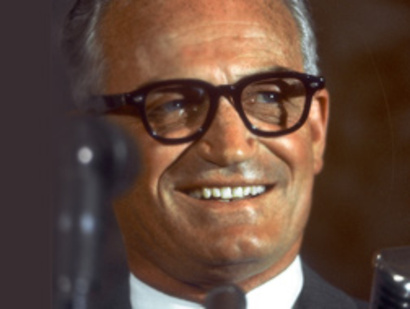If you haven't had a chance to see the HBO documentary on Barry Goldwater by his grand-daughter, you might want to take the time. It didn't have enough politics for this junkie, but it certainly brought to life the spirit of a conservatism now almost entirely eclipsed in the Republican party. Goldwater had no truck for government spending, and raged at the fiscal excesses of his time. By today's Republican standards, the spending he was fulminating against was peanuts. Goldwater was an adamant defender of states' rights, a principle he stuck with even though it meant being smeared as a bigot and a racist. Bush's GOP has no principled interest in federalism, from its education policies to its attacks on states that violate religious doctrines on such issues as marriage, end-of-life matters and even medical marijuana. From the 1970s, Goldwater recognized Falwell and the religious right for what they are: charlatans who have as much concern for traditional conservatism as big government liberals do. What Goldwater would have said about the Schiavo case would not be broadcastable on network television. He also adhered to the old conservative notion of live-and-let-live. He never had a problem with gays, and although he clearly found abortion an awful thing, he wasn't about to remove a female citizen's right in the early stages of pregnancy to control her own body. He was, in other words, a conservative. Or as his great book put it: a conservative with a conscience. And if he was a conservative, then the current Republican party and the current president simply aren't. More and more observers recognize this, especially those who do not have a vested or financial interest in sustaining the charade that this is a conservative administration in any meaningful sense.
The documentary makes much of Goldwater's stance on the 1964 Civil Rights Act and Johnson's astonishingly courageous move to back it. The irony of Goldwater's career is that this decision, made on a principled stance of federalism and limited government, became something else on the ground. It shifted the Republican Party base away from California and the sun-belt into the Deep South. Goldwater was a Western conservative, not a Southern one. And whichever party the South controls will have a hard time reflecting the kind of skeptical, libertarian, tolerant principles Goldwater believed in. So he both created American conservatism and laid the grounds for its eventual implosion. All these years later, the end-result is a Texan president who hasn't seen a civil liberty he wouldn't junk at a second's notice, who bases campaigns on subtle appeals to prejudice and fear of minorities, who has doubled the debt of the next generation, expanded government at a pace not seen since FDR, engaged in two reckless wars without the preparation or manpower to succeed, presided over a government riddled with incompetence and cronyism, and who has nominated candidates to the Supreme Court using their religious faith as a criterion. Whatever else Bush is, he is not merely not Goldwater. He is, in many ways, his nemesis. Which is why conservatism as we have known it has been strangled - by the Republicans. And why the fight to resurrect it must start from almost the same parched earth on which Goldwater confidently took his stand.
Seeing him today, one remembers what courage is. And it's long past time conservatives summoned some up.
